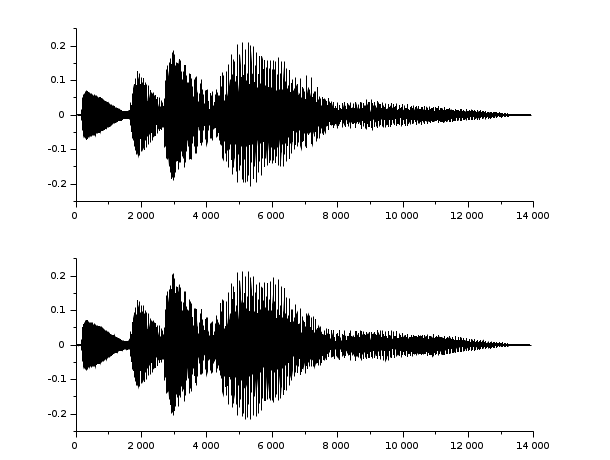wavread
.wav サウンドファイルを読み込む
呼び出し手順
Info = wavread(wavfile, 'info') s = wavread(wavfile, 'size') y = wavread(wavfile) y = wavread(wavfile, n) y = wavread(wavfile, [i1 i2]) [y, Fs, bits] = wavread(..)
引数
- wavfile
文字列. Included heading constant strings
SCI,TMPDIR,SCIHOME, orhomeare automatically expanded. 拡張子が指定されない場合,拡張子 .wav が追加されます.- n
positive integer: number of first samples to get, per channel.
- [i1 i2]
positive integers, to select and return from each channel the samples #i1 to #i2.
- y
Matrix: values of sound amplitudes in [-1,+1], with one row per channel.
- Fs
integer: sampling frequency in Hz = number of samples per second per channel.
- bits
Positive integer: number of bits for
yvalues.- Info
Row vector of 8 decimal integers describing the recorded signal. See the description section for details.
説明
.wavサウンドファイルを読み込む
ユーティリティ関数.
wavread(wavfile) は文字列wavfileで
指定されたサウンドファイルを読み込み,サンプルデータをyに返します.
大きさは [-1,+1]の範囲となります.
以下の形式の多チャネルデータをサポートします:
8-, 16-, および 32ビット,線形, および浮動小数点.
[y,Fs,bits]=wavread(wavfile) は,
ファイル中のデータをエンコードする際に使用された
サンプルレート(Fs) (単位:Hz),ビット数/サンプルを返します.
wavread(wavfile,n)は各チャネルの最初のnサンプルを
返します.
wavread(wavfile,[n1,n2]) はサンプル n1 から n2までを返します.
wavread(wavfile,'size') は,
ファイル中に含まれるオーディオデータの大きさを
[チャネル サンプル] のベクトルとして返します.
wavread(wavfile,'info') returns information
about the audio data contained in the file, instead of the actual audio
data, returning a row vector with the following components:
| (1) | encoding code | : | AKA format category: positive integer = standard id of the type of data encoding. Supported formats: 1 (PCM), 3 (normalized floating point). |
|---|---|---|---|
| (2) | number of channels | : | Number of simultaneous single-valued collected signals = size(y,1). |
| (3) | sampling frequency | : | number of samples recorded for each channel, per second. |
| (4) | average bytes per second | : | For plain PCM it is the sampling rate multiplied by the number of channels and the number of bytes per sample. For compressed formats it is approximately the total data length in bytes divided by the duration of the sound. |
| (5) | block alignment | : | The number of bytes associated with each sampling instant. For the plain PCM uncompressed format, it is equal to the number of channels multiplied by the number of bytes per channel. |
| (6) | bits per sample (per channel) | : | Number of bits used to quantize each value of the sound amplitude. |
| (7) | bytes per sample (per channel) | : | Number of bytes assigned to each individual value of the sound amplitude. |
| (8) | length of sound data (per channel) | : | The total number of samples on each channel = size(y,2).
Hence, the record's duration is Info(8)/Info(3). |
例
File = "SCI/modules/sound/demos/chimes.wav"; wavread(File, "size") wavread(File, "info") y = wavread(File, 5) // 最初の5サンプル y = wavread(File, [4 7]) // only samples #4 to #7 [y, Fs, bits] = wavread(File); Fs, bits clf subplot(2,1,1) plot2d(y(1,:)) // 最初のチャネル subplot(2,1,2) plot2d(y(2,:)) // 2番目のチャネル
--> wavread(File, "size") ans = 2. 13921. --> wavread(File, "info") ans = 1. 2. 22050. 88200. 4. 16. 2. 13921. --> y = wavread(File, 5) // the first five samples y = 0.000061 0.0002747 0.0002136 0.0001526 0.0000916 0.0000916 0.0001831 0.000061 0. 0.0000916 --> y = wavread(File, [4 7]) // only samples #4 to #7 y = 0.0001526 0.0000916 0.0000305 -0.0000305 0. 0.0000916 0.000061 0.0000916 --> [y, Fs, bits] = wavread(File); Fs, bits Fs = 22050. bits = 16.

参照
- auread — .au サウンドファイルを読み込む
- wavwrite — .wavサウンドファイルに書き込む
- analyze — サウンド信号の周波数プロット
- mapsound — Computes and displays an Amplitude(time, frequency) spectrogram of a sound record
- RIFF-wav encoding (p.56)
| Report an issue | ||
| << sound | Sound file handling | wavwrite >> |